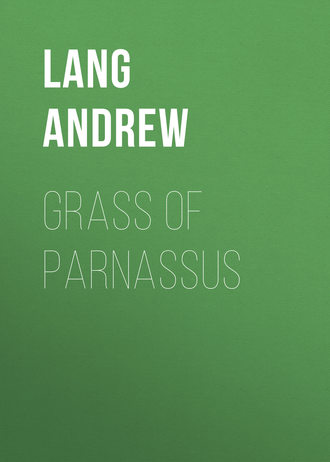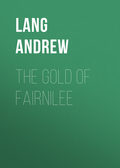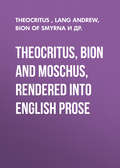полная версия

Lang Andrew
Grass of Parnassus
MELVILLE AND COGHILL
(THE PLACE OF THE LITTLE HAND.)
Dead, with their eyes to the foe,
Dead, with the foe at their feet,
Under the sky laid low
Truly their slumber is sweet,
Though the wind from the Camp of the Slain Men blow,
And the rain on the wilderness beat.
Dead, for they chose to die
When that wild race was run;
Dead, for they would not fly,
Deeming their work undone,
Nor cared to look on the face of the sky,
Nor loved the light of the sun.
Honour we give them and tears,
And the flag they died to save,
Rent from the rain of the spears,
Wet from the war and the wave,
Shall waft men’s thoughts through the dust of the years,
Back to their lonely grave!
RHODOCLEIA
TO RHODOCLEIA
ON HER MELANCHOLY SINGING
(Rhodocleia was beloved by Rufinus, one of the late poets of the Greek Anthology.)
Still, Rhodocleia, brooding on the dead,
Still singing of the meads of asphodel,
Lands desolate of delight?
Say, hast thou dreamed of, or rememberèd,
The shores where shadows dwell,
Nor know the sun, nor see the stars of night?
There, ’midst thy music, doth thy spirit gaze
As a girl pines for home,
Looking along the way that she hath come,
Sick to return, and counts the weary days!
So wouldst thou flee
Back to the multitude whose days are done,
Wouldst taste the fruit that lured Persephone,
The sacrament of death; and die, and be
No more in the wind and sun!
Thou hast not dreamed it, but rememberèd
I know thou hast been there,
Hast seen the stately dwellings of the dead
Rise in the twilight air,
And crossed the shadowy bridge the spirits tread,
And climbed the golden stair!
Nay, by thy cloudy hair
And lips that were so fair,
Sad lips now mindful of some ancient smart,
And melancholy eyes, the haunt of Care,
I know thee who thou art!
That Rhodocleia, Glory of the Rose,
Of Hellas, ere her close,
That Rhodocleia who, when all was done
The golden time of Greece, and fallen her sun,
Swayed her last poet’s heart.
With roses did he woo thee, and with song,
With thine own rose, and with the lily sweet,
The dark-eyed violet,
Garlands of wind-flowers wet,
And fragrant love-lamps that the whole night long
Burned till the dawn was burning in the skies,
Praising thy golden eyes,
And feet more silvery than Thetis’ feet!
But thou didst die and flit
Among the tribes outworn,
The unavailing myriads of the past:
Oft he beheld thy face in dreams of morn,
And, waking, wept for it,
Till his own time came at last,
And then he sought thee in the dusky land!
Wide are the populous places of the dead
Where souls on earth once wed
May never meet, nor each take other’s hand,
Each far from the other fled!
So all in vain he sought for thee, but thou
Didst never taste of the Lethæan stream,
Nor that forgetful fruit,
The mystic pom’granate;
But from the Mighty Warden fledst; and now,
The fugitive of Fate,
Thou farest in our life as in a dream,
Still wandering with thy lute,
Like that sweet paynim lady of old song,
Who sang and wandered long,
For love of her Aucassin, seeking him!
So with thy minstrelsy
Thou roamest, dreaming of the country dim,
Below the veilèd sky!
There doth thy lover dwell,
Singing, and seeking still to find thy face
In that forgetful place:
Thou shalt not meet him here,
Not till thy singing clear
Through all the murmur of the streams of hell
Wins to the Maiden’s ear!
May she, perchance, have pity on thee and call
Thine eager spirit to sit beside her feet,
Passing throughout the long unechoing hall
Up to the shadowy throne,
Where the lost lovers of the ages meet;
Till then thou art alone!
AVE
‘Our Faith and Troth
All time and space controules
Above the highest sphere we meet
Unseen, unknowne, and greet as Angels greet.’
Col. Richard Lovelace. 1649
CLEVEDON CHURCH
In Memoriam
H. B
Westward I watch the low green hills of Wales,
The low sky silver grey,
The turbid Channel with the wandering sails
Moans through the winter day.
There is no colour but one ashen light
On tower and lonely tree,
The little church upon the windy height
Is grey as sky or sea.
But there hath he that woke the sleepless Love
Slept through these fifty years,
There is the grave that has been wept above
With more than mortal tears.
And far below I hear the Channel sweep
And all his waves complain,
As Hallam’s dirge through all the years must keep
Its monotone of pain.
* * * * *
Grey sky, brown waters, as a bird that flies,
My heart flits forth from these
Back to the winter rose of northern skies,
Back to the northern seas.
And lo, the long waves of the ocean beat
Below the minster grey,
Caverns and chapels worn of saintly feet,
And knees of them that pray.
And I remember me how twain were one
Beside that ocean dim,
I count the years passed over since the sun
That lights me looked on him,
And dreaming of the voice that, save in sleep,
Shall greet me not again,
Far, far below I hear the Channel sweep
And all his waves complain.
TWILIGHT ON TWEED
Three crests against the saffron sky,
Beyond the purple plain,
The kind remembered melody
Of Tweed once more again.
Wan water from the border hills,
Dear voice from the old years,
Thy distant music lulls and stills,
And moves to quiet tears.
Like a loved ghost thy fabled flood
Fleets through the dusky land;
Where Scott, come home to die, has stood,
My feet returning stand.
A mist of memory broods and floats,
The Border waters flow;
The air is full of ballad notes,
Borne out of long ago.
Old songs that sung themselves to me,
Sweet through a boy’s day dream,
While trout below the blossom’d tree
Plashed in the golden steam.
* * * * *
Twilight, and Tweed, and Eildon Hill,
Fair and too fair you be;
You tell me that the voice is still
That should have welcomed me.
1870.
METEMPSYCHOSIS
I shall not see thee, nay, but I shall know
Perchance, the grey eyes in another’s eyes,
Shall guess thy curls in gracious locks that flow
On purest brows, yea, and the swift surmise
Shall follow and track, and find thee in disguise
Of all sad things, and fair, where sunsets glow,
When through the scent of heather, faint and low,
The weak wind whispers to the day that dies.
From all sweet art, and out of all old rhyme,
Thine eyes and lips are light and song to me;
The shadows of the beauty of all time,
In song or story are but shapes of thee;
Alas, the shadowy shapes! ah, sweet my dear,
Shall life or death bring all thy being near?
LOST IN HADES
I dreamed that somewhere in the shadowy place,
Grief of farewell unspoken was forgot
In welcome, and regret remembered not;
And hopeless prayer accomplished turned to praise
On lips that had been songless many days;
Hope had no more to hope for, and desire
And dread were overpast, in white attire
New born we walked among the new world’s ways.
Then from the press of shades a spirit threw
Towards me such apples as these gardens bear;
And turning, I was ’ware of her, and knew
And followed her fleet voice and flying hair, —
Followed, and found her not, and seeking you
I found you never, dearest, anywhere.
A STAR IN THE NIGHT
The perfect piteous beauty of thy face
Is like a star the dawning drives away;
Mine eyes may never see in the bright day
Thy pallid halo, thy supernal grace;
But in the night from forth the silent place
Thou comest, dim in dreams, as doth a stray
Star of the starry flock that in the grey
Is seen, and lost, and seen a moment’s space.
And as the earth at night turns to a star,
Loved long ago, and dearer than the sun,
So in the spiritual place afar,
At night our souls are mingled and made one,
And wait till one night fall, and one dawn rise,
That brings no noon too splendid for your eyes.
A SUNSET ON YARROW
The wind and the day had lived together,
They died together, and far away
Spoke farewell in the sultry weather,
Out of the sunset, over the heather,
The dying wind and the dying day.
Far in the south, the summer levin
Flushed, a flame in the grey soft air:
We seemed to look on the hills of heaven;
You saw within, but to me ’twas given
To see your face, as an angel’s, there.
Never again, ah surely never
Shall we wait and watch, where of old we stood,
The low good-night of the hill and the river,
The faint light fade, and the wan stars quiver,
Twain grown one in the solitude.
ANOTHER WAY
Come to me in my dreams, and then,
One saith, I shall be well again,
For then the night will more than pay
The hopeless longing of the day.
Nay, come not thou in dreams, my sweet,
With shadowy robes, and silent feet,
And with the voice, and with the eyes
That greet me in a soft surprise.
Last night, last night, in dreams we met,
And how, to-day, shall I forget,
Or how, remembering, restrain
Mine incommunicable pain?
Nay, where thy land and people are,
Dwell thou remote, apart, afar,
Nor mingle with the shapes that sweep
The melancholy ways of Sleep.
But if, perchance, the shadows break,
If dreams depart, and men awake,
If face to face at length we see,
Be thine the voice to welcome me.







